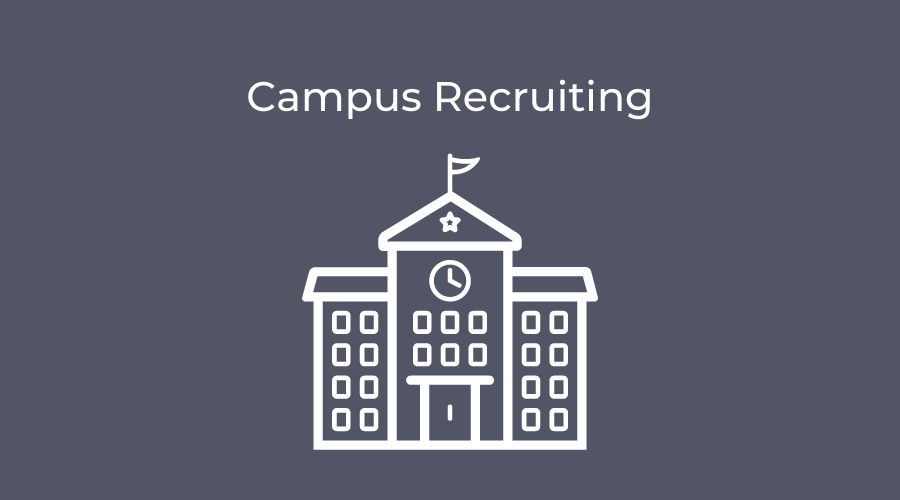
Digital Strategies for Campus Recruiting
“Recruiting with pizza parties is cancelled,” reads a Handshake graphic that cleverly summarizes the state of college recruiting 2021.
It’s as much a nod to the impact of Covid’s effect on campus recruiting as it is a statement of how the pandemic has accelerated the shift to digital recruiting strategies. Handshake, the leading college recruiting platform, says 97% of colleges will host virtual career events this fall; 93% of employers will do the same.
While that’s largely out of necessity, employers and the students themselves are finding virtual recruiting offers advantages over the traditional in-person job fairs and meetings. Half of the 2,400 students in a Handshake survey said they preferred virtual interviewing. Of those who attended a virtual recruiting event, three-quarters appreciated the schedule flexibility; 71% said it was less intimidating, and two-thirds said virtual recruiting was more convenient.
Even after the pandemic ends, 87% of students want at least some recruiting to be virtual; 54% want half of the recruiting events to be virtual. Employers and college career center leaders agree. 79% of employers and 92% of colleges said they will continue to attend and offer virtual recruiting events.
Many employers were experimenting with digital strategies in the years before Covid shut down college campuses. They found success with a multi-pronged approach that included a robust career site aimed at Gen Z, a strong and responsive social media presence, video and livestream events and in-person and virtual job fairs.
Yello, a recruiting platform provider with a campus specialty, surveyed students and recruiting professionals to discover the most effective digital recruiting strategies. Recruiters said webinars/livestreams and group and one-on-one video interviews produced the best results and helped them meet the most students.
Those relying exclusively on campus job board postings and virtual career fairs were less successful and met the fewest candidates.
The 1,000 students in the survey agreed that video interviews, livestream events, virtual coffee chats and phone interviews were all effective ways to connect with them. But they also scored email and social media higher than did the recruiters.
As the evidence suggests, talent acquisition professionals need to go beyond virtual job fairs to include multiple methods of connecting with students. A well-thought out digital strategy should include at least all or most of the following.
Campus Recruiting: Video
Nothing beats video for driving results. Both students and recruiters agree video interviews are the most effective part of a digital strategy. Video interviewing is even more valued by students of color, according to the Handshake survey, which makes it a critical part of reaching diverse communities.
Video also has an important role in building brand awareness and engaging students in the company culture. Video clips on the organization’s career oages and on its social media sites – Facebook, Instagram and Tik Tock – put a face on the company, giving candidates a look at what it’s like to work there.
Campus Recruiting: Webinars and livestreams
Colleges are livestreaming events to recruit students. Employers are doing the same, livestreaming company tours, conversations with employees and company leaders, and Q&As on career opportunities and company culture.
More narrowly focused webinars that target specific departments or majors engage students by discussing career trends and the job market and industry developments..
One important advantage these two digital strategies offer is the ability to collect names and email addresses of attendees. With students ranking email high among their favorite ways of connecting with employers, this allows recruiters to follow up with students.
Campus Recruiting: Coffee chats
These are informal conversations that are not interviews. In pre-Covid days, some recruiters would Tweet out an invitation to meet at the local Starbucks to talk about the industry, get career advice and learn about their company.
The virtual equivalent takes the same approach. They may be one-on-one or group chats. One effective technique is to hold a post-webinar coffee chat to continue the conversation.
Campus Recruiting: Social media
A mistake employers make is to use their social media presence as little more than a bulletin board, posting company news and announcing events. A more valuable approach is to engage students by hosting livestreams or live conversations with recruiters.
Comment on important developments to show industry leadership. Respond to questions about company culture and discuss training and advancement opportunities. Twitter, Instagram and Tik Tok make it easy to target by the use of hashtags. For Facebook and similar sites consider a separate campus recruiting page.
Don’t overlook the review sites like Glassdoor, CareerBliss and Fishbowl. Students don’t. So know what’s posted there and be prepared for tough, even uncomfortable questions. Answer them honestly.
The digitally savvy generation
Today’s college students are as comfortable using tablets and smartphones as previous generations were using typewriters and fax machines. To reach them, employers were adapting their college recruiting strategy to include a strong digital component well before the pandemic. Now, three cycles into Covid-limited campus recruiting, the National Association of Colleges and Employers found almost 8-in-10 employers are continuing to increase their virtual recruiting options.
Digital strategies are still evolving, but as Yello’s survey showed, the most effective recruiting is still personal.
John Zappe reporting.


